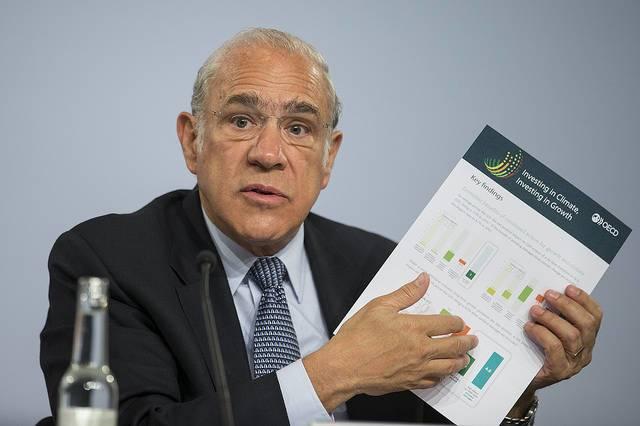
Assertive climate action investment can help boost global economic output, the Organization of Economic Cooperation and Development (OECD) argued in a new report.
In the foreward of the 309-page study, the OECD argues: “Improving productivity and reducing inequalities need not come at the expense of locking the world into a high-emissions future. It is the quality of growth that matters.”
Buttressed by an extensive number of tables, government data and summaries of nations’ climate and energy plans, the OECD recommends several big-ticket measures, including a carbon tax, massive investments in infrastructure and increased financing for low-carbon technologies.
The OECD’s 70-year track record of supporting the case for market-driven helps support the argument that more sustainable development does not have to come at the expense of economic growth. Other global organizations that tout the benefits of a market economy, including the World Bank, have supported the “need for action” in the wake of the global climate agreement reached in Paris in December 2015. And several years ago, the free market beacon The Economist made the case that investment in clean energy and environmental remediation was a necessary “insurance policy” to hedge against future risks the world faced if emissions continue unabated – at a cost of 1 percent of the world’s GDP.
But the OECD’s research comprises a far bolder stance and a more positive result, with its call to action backed up by economic data. And the club of wealthy nations calls out most its very own membership for leading on this front. The Paris-based organization noted that G20 nations account for 85 percent of global GDP, as well as 80 percent of carbon emissions – and therefore, they should lead the world by implementing a hybrid of pro-economic growth and pro-environmental policies. In other words, the world’s largest economies need to stop any placement of blame for climate change on emerging economies such as China and India.
From OECD economists’ point of view, investments in renewables, the reduction of fossil fuel subsidies and incentives for the private sector to ramp up spending on low-emission technologies can be a net positive. According to the OECD, if the G20 nations adopt such growth policies more aggressively, they could add a cumulative 1 percent to their average economic output by 2021. Should those policies and investments continue to scale and accelerate over the next few decades, a total of 2.8 percent could be added to these nations’ average GDP by 2050.
Considering the OECD predicts global GDP growth with be 3.5 percent at most during 2017, that additional boost should raise the attention of policy makers, as well as anxious citizens who keep confronting an increasingly tight job market.
As for the other 2.2 percent, the OECD arrived at its total 5 percent figure in 2050 by accounting for the avoided costs resulting from climate change mediation, including the prevention of extensive damage from sea level rise or volatile weather such as storms. Recent data offered by scientists in Antarctica, for example, suggest that continent’s loss of ice could double sea level rise worldwide by the end of this century. Another report suggested the U.S. could lose up to $1 trillion in real estate values over the next several decades, with states like Florida being hit particularly hard by the disappearance of coastal communities.
And in the big picture, the OECD insists that a more aggressive investment approach to mitigate climate change risks would not be excessive. Limiting global temperature rise to 2°C this century would cost G20 nations $6.9 trillion annually from now until 2030 – only 10 percent more than projections for what is now a far more carbon-intensive spending plan worldwide.
Image credit: Axel Schmidt for OECD/Flickr

Leon Kaye has written for 3p since 2010 and become executive editor in 2018. His previous work includes writing for the Guardian as well as other online and print publications. In addition, he's worked in sales executive roles within technology and financial research companies, as well as for a public relations firm, for which he consulted with one of the globe’s leading sustainability initiatives. Currently living in Central California, he’s traveled to 70-plus countries and has lived and worked in South Korea, the United Arab Emirates and Uruguay.
Leon’s an alum of Fresno State, the University of Maryland, Baltimore County and the University of Southern California's Marshall Business School. He enjoys traveling abroad as well as exploring California’s Central Coast and the Sierra Nevadas.














